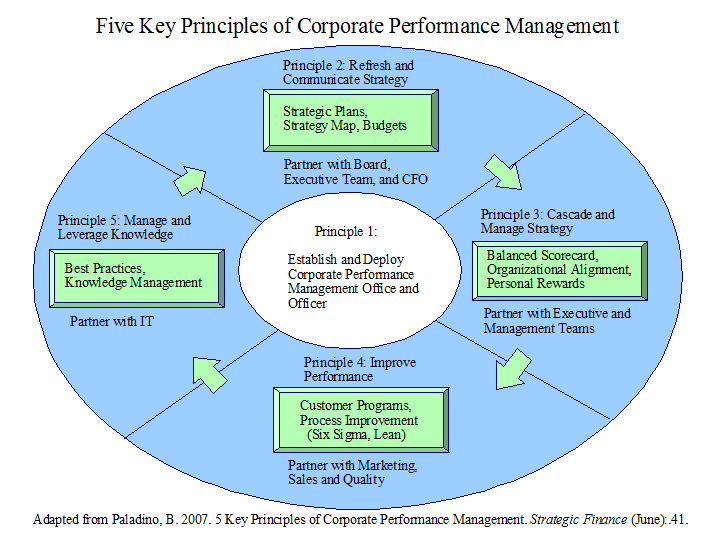
Summary by James R. Martin, Ph.D., CMA
Professor Emeritus, University of South Florida
Performance Management Systems Main Page | Control
Main Page | Strategy Main page
This is the first part of a three part article series adapted from Paladino's book Five Key Principles of Corporate Performance Management.1 The purpose of this article is to introduce the five key principles related to executing strategy and to provide three examples related to how award winning companies have used the first principle. The five principles are based on studies of award-winning enterprises, and extends the work on business genetics presented in a book by Charles Fine.2 In his book, Clockspeed Fine discussed four barriers to the successful implementation of a company's strategy. According to Paladino, the five principles outlined in this series of articles provide guidance that will enable an organization to rapidly and successfully implement their strategy through an integrated set of CPM stages. The principles include:
1. Establish and deploy a corporate performance management office and officer.
2. Refresh and communicate strategy.
3. Cascade and manage strategy.
4. Improve performance.
5. Manage and leverage knowledge.
The five principles and some related concepts are presented in the graphic below adapted from Paladino's illustration on page 41.

The main thrust of this article is to provide three examples related to how award winning companies have used the first principle. The companies include Bronson Methodist Hospital, Serono (a biotechnology company), and Universal Weather and Aviation. In the second article of the series Paladino provides examples of how companies use principles 2 and 3. The final article extends the examples to best practices in the area of principles 4 and 5.
____________________________________________________
1 Paladino, B. 2007. Five Key Principles of Corporate Performance Management. John Wiley and Sons. The other two articles in this series are: Paladino, B. 2007. 5 key principles of corporate performance management: Successful companies plan, communicate, and manage strategy well. Strategic Finance (July): 33-41; and Paladino, B. 2007. 5 key principles of corporate performance management: Award-winning companies use them to improve their performance and manage and leverage knowledge for success. Strategic Finance (August): 39-45.
2 Fine, C. H. 1999. Clockspeed: Winning Industry Control in the Age of Temporary Advantage. Basic Books. A more recent version is Fine, C. H. 2012. Clockspeed: Winning Industry Control in the Age of Temporary Advantage. ReadHowYouWant.
Related publications and summaries:
Chenhall, R. H. 2003. Management control system design within its organizational context: Findings from contingency-based research and directions for the future. Accounting, Organizations and Society 28(2-3): 127-168. (Summary).
Covaleski, M. and M. Aiken. 1986. Accounting theories of organizations: Some preliminary considerations. Accounting, Organizations and Society 11(4-5): 297-319. (Summary).
Covaleski, M. A., M. W. Dirsmith and S. Samuel. 1996. Managerial accounting research: The contributions of organizational and sociological theories. Journal of Management Accounting Research (8): 1-35. (Summary).
Ferreira, A. and D. Otley. 2009. The design and use of performance management systems: An extended framework for analysis. Management Accounting Research (December): 263-282. (Summary).
Langfield-Smith, K. 1997. Management control systems and strategy: A critical review. Accounting, Organizations and Society 22(2): 207-232. (Summary).
Macy, G. and V. Arunachalam 1995. Management accounting systems and contingency theory: In Search of effective systems. Advances in Management Accounting (4): 63-86. (Summary).
Martin, J. R. Not dated. Balanced scorecard concepts. Management And Accounting Web. BalScoreSum.htm
Neimark, M. and T. Tinker. 1986. The social construction of management control systems. Accounting, Organizations and Society 11(4-5): 369-395. (Summary).
Otley, D. 1999. Performance management: A framework for management control systems research. Management Accounting Research (December): 363-382.
Paladino, R. E. 2005. Balanced forecasts drive value. Strategic Finance (January): 37-42.
Paladino, B. 2007. 5 key principles of corporate performance management: Successful companies plan, communicate, and manage strategy well. Strategic Finance (July): 33-41.
Paladino, B. 2007. 5 key principles of corporate performance management: Award-winning companies use them to improve their performance and manage and leverage knowledge for success. Strategic Finance (August): 39-45.
Paladino, B. 2008. Strategically managing risk in today's perilous markets. Strategic Finance (November): 26-33.
Paladino, B. 2010. Innovative Corporate Performance Management: Five Key Principles to Accelerate Results. John Wiley and Sons.
Paladino, B. 2011. Achieving innovative corporate performance management. Strategic Finance (March): 43-51.
Paladino, B. 2011. Achieving innovative corporate performance management. Strategic Finance (April): 43-53.
Tiessen, P. and J. H. Waterhouse. 1983. Towards a descriptive theory of management accounting. Accounting, Organizations and Society 8(2-3): 251-267. (Summary).
Van der Merwe, A. 2007. Management accounting philosophy I: Gaping holes in our foundation. Cost Management (May/June): 5-11. (Summary).
Van der Merwe, A. 2007. Management accounting philosophy II: The cornerstones of restoration. Cost Management (September/October): 26-33. (Summary).
Van der Merwe, A. 2007. Management accounting philosophy III: The management accounting evaluation framework. Cost Management (November/December): 20-29. (Summary).
Van der Merwe, A., B. D. Clinton, G. Cokins, C. Thomas, K. Templin and J. Huntzinger. 2012. Conceptual Framework for Managerial Costing: Draft Report of the IMA Managerial Costing Conceptual Framework Task Force. IMA. (Summary).
Simons, R. 1995. Levers of Control: How Managers Use Innovative Control Systems to Drive Strategic Renewal. Boston: Harvard Business School Press. Also see Simons, R. 1995. Control in an age of empowerment. Harvard Business Review (March-April): 80-88. (Summary and related Note).